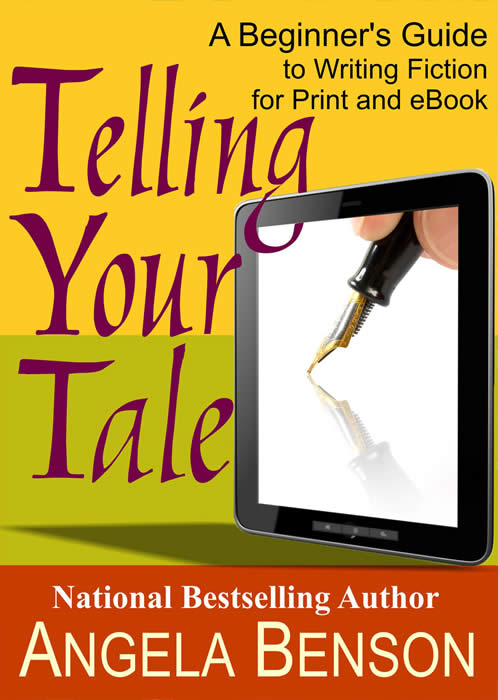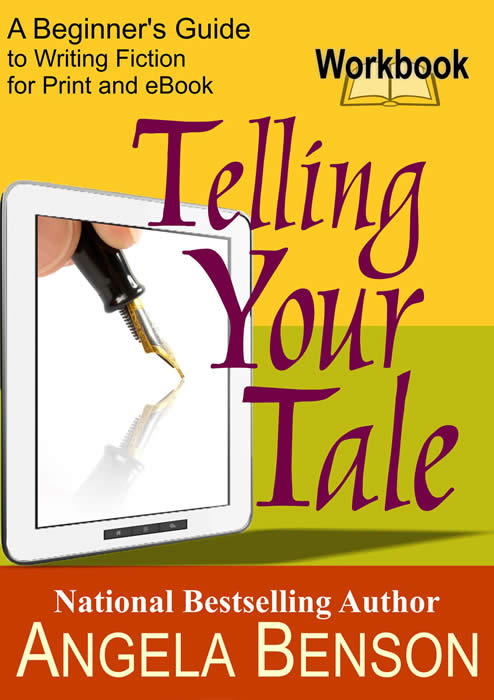
More about Telling Your Tale
 Telling Your Tale: A Beginner's Guide to Writing for Print and eBook Telling Your Tale: A Beginner's Guide to Writing for Print and eBook
December 2011
ebook
PURCHASE
Telling Your Tale Workbook
December 2011
ebook
PURCHASE
Orginally published by Berkley Books as Telling The Tale: The African-American Fiction Writers Guide
Reviewers on Telling The Tale!
"Benson knows her stuff, and her wonderful reference book for African-American fiction writers would be equally useful to writers of any ethnicity." -Writers Write, the Internet Writing Journal
EXCERPT
A Writers Tale
Oftentimes people ask me how I started writing.  And it's always a difficult question for me to answer because I never know where to start. Do I start in 1970 when I wrote my first story in Ms. Milazo's fifth grade class or do I start in 1992 when I attended the Romantic Times Readers and Writers Convention in Savannah, Georgia? For this introduction, I think it appropriate that I start in 1992. And it's always a difficult question for me to answer because I never know where to start. Do I start in 1970 when I wrote my first story in Ms. Milazo's fifth grade class or do I start in 1992 when I attended the Romantic Times Readers and Writers Convention in Savannah, Georgia? For this introduction, I think it appropriate that I start in 1992.
Prior to 1992, I was a research engineer for a major telecommunications company. My job was planning new telephone services. I used to tell people that it was the best job in the world—if you had to work for a living. And it was true. It was a wonderful job. But sometime around 1990 I began to go through what I now call an early midlife crisis. I began to question my job and the role it played in my life. Was my job something I did or was it an extension of who I was as an individual? The unsettling and unsatisfying answer was that my job was something I did that was completely separate from who I was as a person. On some level this separation could be considered a good thing, but my reasoning was that if I was going to spend at least one-third of every day of my life working at something, it should be something that was an extension of who I was as a person. A lofty goal, I admit, but that lofty goal set me off on a quest to find a vocation that would fulfill my financial needs as well as my personal need for self-expression.
The journey took me down several paths. I sold Amway for about two weeks, until I realized that I didn't like being away from home so much of the time. I investigated becoming a secondary school teacher and would have done so had I not been told that first I had to take a computer science course. Taking a computer course seemed redundant, given that I'd been working as an engineer for over ten years. Next, I became a distributor for a multilevel marketing diet program thinking that I could lose weight then help others to lose weight too. That brief stint ended when I realized I wasn't losing any weight. I could go on, but I think you get the point: I made a lot of false starts in my quest for a new and fulfilling vocation.
I finally hit the motherlode in 1992 while on a business trip in New Jersey. A closet romance reader since my college days, I ran across a copy of Romantic Times magazine in a local bookstore and learned about the Readers and Writers Convention being held that weekend in Savannah, not far from my Atlanta home. After checking with the airlines and learning that a round-trip ticket to Savannah would add only one hundred dollars to my fare, I decided to attend the convention.
That decision changed my life. Sounds dramatic, I know, but it's true. Writing workshops given by published authors were a part of the convention agenda. One of the workshops I attended was conducted by three romance writers who'd each had more than one book published. I don't remember the topic or anything specific that the authors said, but I do remember that as they spoke, a single thought formed in my mind: They don't look any smarter than me. If they can write a book, so can I.
And so began my writing career. I went back home, joined a local writers' group, and began my first novel. That novel, which I started in early 1992, was completed in early 1993, sold to Pinnacle Books in late 1993, and arrived in bookstores in late 1994.
Some of my published friends hate it when I tell this story. They accuse me of perpetuating the myth that anybody with a pencil (or a typewriter or a computer) can write a book. They say that the story, especially my epiphany, completely discounts the skills that a writer must cultivate in order to produce a publishable book. I agree with them to a point, but I continue to tell the story for three reasons.
First, the story shows that I came to writing because I had a need to express myself more fully. I didn't start writing for the big-money payoff; I started writing because there was something inside me that I wanted and needed to explore.
Second, the story shows that I had some faith in my ability to become a writer. In my mind, becoming a writer was an attainable goal. Like most endeavors, though, writing required a lot more work than I had expected and with it came more disappointment than I could have imagined. Fortunately, the childlike faith that motivated me to start has kept me writing in spite of the disappointments.
Third, the story shows the power of living and breathing examples. I decided I could become a writer because I saw other people not that much different from myself (at least, I didn't focus on the differences) who had become writers. The women who gave that workshop at the convention were giving hope as much as they were teaching writing skills.
The third point is the reason I decided to write Telling Your Tale. This book is my way of serving as a living and breathing example to you and other would-be and novice writers I will probably never have the opportunity to meet. I hope that as you read this book and complete the assignments your faith in your ability to tell your own tale will be enhanced. I want you to read this book and think as I thought back in 1992: She doesn't seem any smarter than me. If she can write a book, so can I.
Purchase Telling Your Tale
December 2011
ebook
PURCHASE
Purchase Telling Your Tale Workbook
December 2011
ebook
PURCHASE |